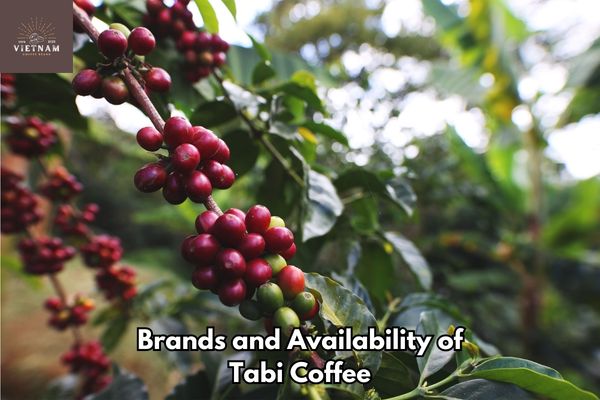Originating in the Antioquia region of Colombia, Tabi coffee is a premium variety prized for its exquisite flavor and resistance to coffee leaf rust. Through meticulous crossbreeding of Caturra, Colombia, and rare Sidra varieties, Tabi coffee was developed to combine the best attributes of its parent beans.
What truly sets Tabi apart is its robust defense against the devastating coffee leaf rust fungus, which poses a major threat to global coffee production. Beyond disease resistance, Tabi boasts a sublime flavor profile with mild acidity, sweetness, and a full bodied taste.
Grown in Colombia’s mineral-rich volcanic soil and high elevations, Tabi coffee produces higher yields of large, flavorful beans compared to other varieties. Tabi’s remarkable story is a testament to Colombia’s expertise in cultivating diverse, high quality coffee.
Key Takeaways
- Tabi coffee beans are a hybrid of the Timor and Caturra coffee varieties, known for their resistance to coffee leaf rust and high cup quality.
- Tabi coffee has a mild acidity with a full body and earthy flavor, with flavor profiles including mango and butter biscuits.
- Tabi coffee is typically grown in Colombia at elevations ranging between 5500 and 6300 feet, taking advantage of the mild temperature, volcanic soil, and high elevations.
- Tabi coffee contributes to sustainability efforts in the coffee industry by reducing the need for chemical pesticides and supporting environmental stewardship and biodiversity.
What is Tabi coffee?
Tabi coffee originated in Colombia in 2002 as part of efforts to combat the leaf rust disease. This specialty coffee is a hybrid of three premium Arabica varieties – Bourbon, Typica, and Timor.
The name “Tabi” means “good” in the native Guambiano language, reflecting the exceptional cup qualities of its Bourbon and Typica parent beans. Tabi exhibits the sweet, complex flavors of these varieties along with the high productivity and rust resistance conferred by Timor.
By combining the best traits of its parent beans, Tabi coffee offers both scrumptious flavor reminiscent of Bourbon and Typica, and robust crop yields in the face of virulent leaf rust fungus. Tabi’s origins and genetics make it a truly special coffee.
Background of Tabi Coffee

The Tabi coffee variety was first cultivated in 1971 at the renowned La Pradera farm in Colombia. Farmers perfected techniques for growing Tabi to take advantage of Colombia’s ideal coffee-growing conditions – mild temperatures, volcanic soil, and high elevations.
Specific cultivation methods like XXX are used to ensure Tabi’s exceptional cup quality and resistance to coffee leaf rust. Tabi’s introduction in the early 2000s helped solve the devastating leaf rust epidemic, reinforcing Colombia’s reputation for premium coffee.
As an heirloom varietal with a rich background, Tabi represents the prized flavors and heritage of Colombia’s coffee lands. The unique story of Tabi coffee exemplifies the diversity and craftsmanship of Colombian coffee cultivation.
Flavor Profile
The flavor profile of Tabi coffee, a unique Colombian variety, invites passionate coffee connoisseurs to embark on a sensory journey and discover Java coffee in a whole new dimension, with its exquisite blend of bright citrusy notes, delicate floral undertones, and a hint of caramel sweetness.
The flavor profile of Tabi coffee is often described as having a chocolatey body with citrus and berry notes, similar to Ethiopian Sidama coffee.
When I taste Tabi coffee, I experience a mild acidity with a full body and an earthy flavor. The flavor profile of this coffee is truly unique and captivating.
It starts with a fresh, clean crisp body that evolves into notes of honey and nut butter. There are also hints of mango and butter biscuits, adding a delightful sweetness to the cup.
The taste can vary based on brewing techniques, allowing for experimentation and personalization. To enhance the flavor of this coffee, it is essential to explore different brewing methods such as pour-over, French press, and espresso. Adjusting the grind size and water temperature can also affect the taste.
Furthermore, This is not only delicious but also sustainable. Its resistance to coffee leaf rust reduces the need for chemical pesticides, contributing to sustainable farming practices.
By enjoying this, you not only indulge in a rich and flavorful experience but also support the sustainability practices of Colombian coffee farmers.
The Ideal Growing Conditions for Tabi Coffee in Colombia

The exceptional quality of Tabi coffee is attributed to Colombia’s ideal growing conditions. With mild temperatures, nutrient-rich volcanic soil, and high elevations between 5500-6300 ft, Colombia provides the perfect environment for Tabi plants to thrive.
These meticulously maintained conditions, mirroring those of Yirgacheffe coffee cultivation, allow Tabi beans to develop their signature complex flavor profile.
For local farmers, Tabi coffee provides a sustainable income source and supports the preservation of traditional cultivation practices and environmental stewardship. The popularity of this unique variety promotes sustainability across Colombia’s coffee industry.
Tabi Coffee Variety Characteristics
Tabi coffee beans are a hybrid of Bourbon, Typica, and Timor known for their complex flavor profile with tasting notes of chocolate, citrus, and berries. The Tabi variety stands out for its exceptionally large bean size compared to Bourbon and Typica.
These beans can be grown in high densities up to 3000 trees per hectare without compromising on quality. When it comes to roasting, Tabi coffee is highly versatile – light, medium and dark roasts can accentuate different desirable flavors.
A medium roast brings out tastes of honey and nut butter, while a dark roast elicits more intense, earthy notes. With a range of roast levels to explore, coffee aficionados can truly experience the full potential of Tabi’s unique flavor nuances.
Brands and Availability

While exploring Limu coffee from Ethiopia, it’s fascinating to discover the diverse brands and availability of Tabi coffee, offering coffee enthusiasts a delightful array of options to indulge in their passion for unique and exquisite flavors.
Fortunately, there are several reputable brands that offer Tabi coffee beans and they can be found in specialty coffee shops or through online retailers. These brands have established a strong reputation for delivering high-quality this coffee beans that coffee enthusiasts can enjoy.
Here are three reasons why exploring these brands and trying alternative brewing methods with this coffee beans can be an exciting and fulfilling experience:
Taste Exploration: Each brand brings its unique flavor profile to the table, allowing coffee lovers to explore different nuances and characteristics of this coffee. From fruity and floral notes to rich and chocolatey undertones, the possibilities are endless.
Brewing Creativity: Tabi coffee beans are versatile and adapt well to alternative brewing methods such as cold brew, Aeropress, or even Turkish coffee. Trying these methods can unlock new dimensions of flavors and enhance your coffee brewing skills.
Supporting Sustainable Practices: Many of these brands prioritize sustainability and work directly with Colombian coffee farmers who grow Tabi coffee. By purchasing their products, you are not only enjoying a delicious cup of coffee but also supporting environmentally-friendly practices and the livelihoods of coffee farmers.
So, why not venture into the world of this coffee beans and discover the incredible offerings from these reputable brands? Your taste buds and the Colombian coffee community will thank you.
Cultural Significance
Exploring the cultural significance of this coffee unveils the deep-rooted traditions and expertise of Colombian coffee growers.
The cultivation of this coffee is not just about producing a high-quality beverage; it is a testament to the rich cultural traditions and sustainable farming practices that have been passed down through generations.
Colombian coffee growers take immense pride in their ability to cultivate Tabi coffee beans, combining disease resistance with exceptional cup quality.
This dedication to sustainable farming ensures that the coffee industry in Colombia thrives while preserving the environment and biodiversity.
By purchasing Tabi coffee, we support the livelihoods of these farmers and contribute to the continuation of these cultural traditions.
Each sip of Tabi coffee is a celebration of Colombia’s rich coffee heritage and a testament to the commitment of its farmers to producing exceptional coffee.
Overview of Colombia variety coffee
Colombia is one of the few countries that produces exclusively Arabica coffee varieties. This is due to Colombia’s optimal geography and climate for growing high quality Arabica.
Arabica thrives in equatorial regions with consistent sunlight and warmth. Colombia’s mountainous terrain with elevations of 1200-2300m and temperatures of 18-24°C offers the perfect high altitude Arabica needs. Additionally, evenly distributed rainfall, nutrient-rich volcanic soil, and biodiversity enable Colombia to be a prime Arabica grower.
Arabica originated in Ethiopia and requires the steady sunlight and warmth found near the equator. Colombia shares similar conditions, making it an ideal location to cultivate the highest quality Arabica beans. Next, let’s examine the specific Arabica varieties grown in Colombia beside Tabi:
- Typica Beens Variety
- Bourbon
- Caturra
- Maragogipe
- Variedad Colombia (Colombia Variety)
- Castillo
Frequently Asked Questions
Conclusion
In conclusion, as a coffee enthusiast, I must say that Tabi coffee beans from Colombia are truly a remarkable discovery. The extensive research and development that went into creating this hybrid variety by CENICAFE have paid off tremendously.
The Tabi coffee beans not only possess exceptional disease resistance but also offer a delightful flavor profile that is sure to please any coffee connoisseur. With its mild acidity, full body, and notes of honey, nut butter, mango, and butter biscuits, this coffee truly stands out from the crowd.
It is no wonder that these beans have become such a significant part of Colombia’s coffee industry, contributing to the country’s reputation for producing high-quality coffee. So, if you’re looking to experience the best of Colombian coffee, I highly recommend giving this a try. You won’t be disappointed.






